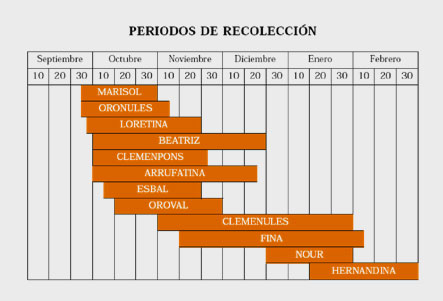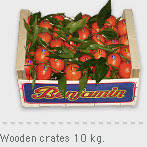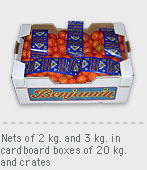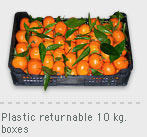History
The clementine (hybrid plant between the mandarin and the Algerian wild orange) is a fruit which owes its name to a monk called Climent, in charge of an agricultural orphanage in Messerghin, Algeria, who discovered it when the idea occurred to him to mix the mandarin with the bitter orange.
The main varieties of clementines are the ‘clementina fina’, the ‘hernandina’ and the ‘cleménula’. They are collected when the maturity index reaches its minimum established values and the juice content is adecuate, depending on the variety. This has to be carried out in the absence of dew or mist, and with the use of pliers, without any sharp thrusts, so as to avoid pulling off the skin of the fruit.
Properties
The excellent nutritional qualities of oranges have been known since time immemorial. Dr. Gregorio Marañon, for example, in his “Medical Tribute to the Orange”, already manifested its qualities and, since then, medical and technical publications have continued to contribute new data about their benefits to health.
Next we will describe the main characteristics of orange juice.
| Element | Gr./100 gr. of juice |
| Water | 87.4 |
| Reducing sugars | 5.2 |
| Sacharose | 4.7 |
| Acids | 1 |
| Nitrogenated substances | 1 |
| Lipids | 0.33 |
| Dry material | 0.37 |
The juice contains the following amounts of vitamins:
| Element | Mg./100 ml. of juice |
| Vitamin C | 60 mg |
| Vitamin B6 | 60 mg |
| Thianine | 100 mg |
| Riboflavine | 45 mg |
| Biotine | 1 mg |
| Pantotenic acid | 150 mg |
| Niacine | 250 mg |
The high level of Vitamin C in citrus fruits in comparison with other fruits is well known by everyone, as summarised below:
| Specie | Vitamin C (mg./100 gr) |
| Orange | 60 mg |
| Strawberry | 50 mg |
| Melon | 33 mg |
| Apple | 8 mg |
| Grape | 5 mg |
In short, we can say that one glass of orange juice a day provides you with:
Vitamina C: 100 mg (100% of daily needs). Vitamin A, B1, B2, B6.
Minerals: Sodium, Potassium, Calcium, Magnesium, Iron, Phosphorus, Sulphur and Chlorine.
Sugars: Fructose, glucose and sacarose.
Amino acids, Flavonoids, Volatiles, Carotenoids, Enzymes and Lipids.
Furthermore, its calory content is very low, due to its low content in carbohydrates, fats and proteins.
All this compendium of elements, essential for good health, result in innumerable health benefits. In the words of Dr Ana Haro of the University of Granada: in a natural way, without any supplement from medicines or synthetic products, the habitual consumption of orange brings about the following benefits:
• Reinforcement of our organism's defenses and the prevention of and fight against infectious processes originating from viruses or bacteria. The consumption of oranges in winter prevents colds and influenza.
• Maintenance of gums, teeth and healthy bones. The orange is rich in calcium magnesium, phosforus and vitamin C, essential for the healthy maintenance and growth of bones. It is highly recommended for osteoporosis, rickets and during periods of bone growth.
• Maintenance of a healthy skin. Vitamin C helps to form collagen, which is essential for the epidermis.
• Prevention of the formation of coagulation and thrombosis the inhibition of the accumulation of plaque, being very useful in the treatment and prevention of cardiovascular diseases.
• Help to combat anaemia. Its content in vitamin C favours the absorbtion of iron by the organism.
• Exert an anti-oxidising efffect and prevent damage by free radicals, the causes of degenerative diseases like arteriosclerosis, cancer and the ageing process, and also chronic illnesses such as those derived from the consumption of tobacco. Orange contains four highly efficient antioxidants that mutually enhance each others' effects, namely vitamin C, quercine, provitamin A and folic acid.
• Help normalize high cholesterol levels in blood, due to the presence of pectine (soluble fibre).
• Prevent constipation and intestinal atony due to its fibre content. A glass of orange juice on an empty stomach is a very efficient remedy for constipation.
• Prevent allergies. The daily consumption of oranges seems to prevent the appearance of allergic reactions such as rhinitis or bronchial asthma. Scientific studies have demonstrated a possible relation between high levels of vitamin C in the blood and a reduced risk of allergies.
• Contribute to the cure of gout. It facilitates the dissolution and elimination of urate deposits which cause gout.
• Prevent the appearance of some kinds of cancer. The combined effect of vitamin C, flavonoids and limonoids, can prevent and slow the development of malignant tumours because they can neutralize the cancer-causing substances that trigger the tumour processes. In fact the International Cancer Institute of USA, attributes the reduction of stomach cancers in recent years to the massive consumption of orange juice.
That is why we believe that a daily intake of orange juice is very important for a healthy diet, and for use in preventative medicine for all the complaints previously mentioned.
Recipes
Mandarin Cream Caramel
Ingredients:
For 4 persons
6 mandarins
9 tablespoons of sugar
3 eggs
300 ml. of liquid cream
¼ glass of mandarin liqueur
a little water
a dash of lemon juice
mint leaves
one arbutus berry
Preparation:
Put 4 tablespoons of sugar into a frying pan, add a little water and a few drops of lemon juice. Put on heat and boil until a dark caramel is formed. Brush a mould apt for the oven and put aside.
Squeeze the juice out of 4 of the mandarins.
Grate the outside of the mandarin peels. Mix the gratings with the other 5 spoonfuls of sugar. Add the eggs and beat with a hand whisk. Add the mandarin liqueur, 100 ml of cream and the juice. Beat well and pour the mixture onto the caramelised mould.
Prepare a bain-marie in the oven at 175-180?C for about 25 minutes. Allow to cool down and remove from the mould.
Whip the ceam with an electric whisk. Put the whipped cream into a pastry sleeve. Peel the mandarins that you grated previously, separate them into segments and cut them in half lengthways. Adorn the cream caramel with the whipped ceam and the orange segments.
Mandarin pudding
Ingredientes:
For 4 persons
6 mandarins
6 tablespoons of sugar
4 eggs
½ glass of virgin extra olive oil
4 tablespoons of flour
mint leaves
- For the yoghurt sauce:
1 natural yoghurt
2 teaspoons of sugar
1 tablespoon of blackberry liqueur
blackberries, raspberries, gooseberries
chopped roasted almonds
Preparation:
Clean the mandarins. Grate the peel of 4 of them onto the sugar. Peel the mandarins, cut them in half and put them in a mixer.
Add 4 tablespoons of aromatized sugar, the eggs and the oil and mix in an electric mixer. Mix in the flour and beat for a while. Pass everything through a sieve. Pour the mixture into individual moulds and put into the oven at 170-180?C for 15-20 minutes. Leave to cool down.
Cut the other 2 mandarins into thin slices and cook them in a frying pan with the other 2 tablespoons of sugar.
Mix the yoghurt with the sugar, the liqueur, a few redcurrants, raspberries and blackberries. Remove the puddings from the mould, accompany with the mandarin preserve and a little yoghurt sauce sprinkled with chopped almonds. Decorate with a few mint leaves.
Seasonal Calendar

Varieties
---
Packaging
 |
 |
 |
 |
 |